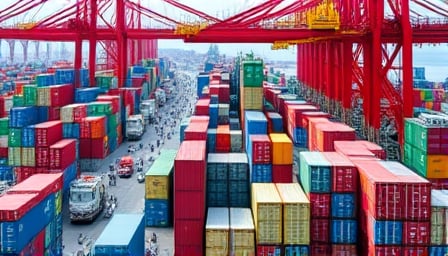COSCO SHIPPING Specialized Carriers Co Ltd: A Strategic Expansion in Maritime Logistics
In a bold move that underscores its commitment to dominating the marine transportation sector, COSCO SHIPPING Specialized Carriers Co Ltd has recently made headlines with a series of strategic decisions aimed at expanding its fleet and enhancing its service offerings. As a key player in the marine and coastal freight transportation industry, the company’s latest maneuvers are not just about growth but about setting new standards in efficiency and global reach.
A Fleet Expansion That Speaks Volumes
At the heart of COSCO SHIPPING’s recent announcements is the acquisition of four 9,000-ton specialized liquid cargo ships by its wholly-owned subsidiary, Guangzhu. This move, confirmed in a press release, is a clear signal of the company’s intent to bolster its capabilities in transporting liquid cargo, a segment that demands high specialization and reliability. The decision, ratified in the company’s eighth board meeting, is not just an expansion of assets but a strategic enhancement of its service portfolio, catering to the nuanced needs of various industries reliant on liquid cargo transportation.
A Critical Eye on Strategic Decisions
While the expansion is a positive step, it’s crucial to scrutinize the implications of such a significant investment. The acquisition comes at a time when the company’s stock has seen fluctuations, with a close price of 6.77 CNH as of July 28, 2025, and a 52-week range between 5.32 and 8.11 CNH. With a market cap of 193.7 billion CNH and a price-earnings ratio of 9.87, the financial health of COSCO SHIPPING is robust, yet the strategic allocation of resources towards fleet expansion warrants a critical examination. Is the company leveraging its financial strength to secure a competitive edge, or is it overextending in a bid to capture market share?
Opening New Avenues in Global Trade
In a parallel development that complements its fleet expansion, COSCO SHIPPING has played a pivotal role in the inauguration of the “Xiaomu-Australia” roll-on/roll-off (RoRo) international trade route. This new maritime corridor, facilitated by the company’s subsidiary, the Far Seas Automobile Shipping Company, marks a significant milestone in global automotive logistics. By enabling the direct shipment of vehicles from Xiaomu International Logistics Port to Australia in as little as 10 days, COSCO SHIPPING is not just enhancing its service offerings but is actively shaping the future of international trade routes.
The Strategic Implications of the Xiaomu-Australia Route
The launch of the Xiaomu-Australia route is a testament to COSCO SHIPPING’s strategic foresight. By tapping into the burgeoning demand for electric vehicles in Australia, the company is positioning itself at the forefront of a rapidly evolving market. This move is not just about expanding its geographical footprint but about aligning its services with the future of transportation. However, the success of this venture hinges on the company’s ability to maintain operational efficiency and navigate the complexities of international trade regulations.
Looking Ahead: A Vision for the Future
As COSCO SHIPPING SPECIALIZED CARRIERS CO LTD continues to expand its fleet and explore new trade routes, the company stands at a crossroads. The decisions made today will not only shape its trajectory in the marine transportation industry but will also influence the broader dynamics of global trade. With a strategic vision that encompasses fleet expansion, service diversification, and route innovation, COSCO SHIPPING is poised to redefine the standards of maritime logistics. However, the path ahead is fraught with challenges, and the company’s ability to navigate these waters will be the true test of its strategic acumen.
In conclusion, COSCO SHIPPING SPECIALIZED CARRIERS CO LTD’s recent strategic decisions underscore its ambition to lead in the marine transportation sector. By expanding its fleet and opening new trade routes, the company is not just responding to the demands of the market but is actively shaping the future of global trade. As it moves forward, the company’s success will depend on its ability to balance strategic expansion with operational efficiency and financial prudence.
